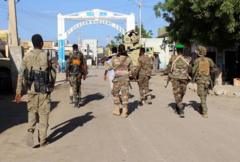President Cyril Ramaphosa emphasized the importance of multilateralism during G20 foreign ministers' talks, amidst rising tensions with the US, resulting from the absence of high-ranking American officials at the summit.
**G20 Talks Under Strain as US Officials Absent from South Africa's Summit**

**G20 Talks Under Strain as US Officials Absent from South Africa's Summit**
The South African presidency at the G20 faces challenges with US leaders opting out of key discussions.
In a significant push for international collaboration, South Africa's President Cyril Ramaphosa addressed the G20 foreign ministers, highlighting the need for a firm commitment to multilateralism and adherence to international law as essential for addressing global crises. This declaration comes at a time when relations between South Africa and the United States have deteriorated, particularly under the Trump administration's "America First" stance. US Secretary of State Marco Rubio notably boycotted the meeting in Johannesburg, stating he would not support what he perceives as anti-American sentiments, while Treasury Secretary Scott Bessent cited prior engagements as a reason for his absence at the upcoming G20 finance ministers' meeting.
As the first African nation to hold the G20 presidency, South Africa aims to advocate for the interests of developing countries in dialogues with the economic powerhouses of the world, which collectively account for over 80% of the global economy and two-thirds of the population. Despite the absence of top US officials, foreign ministers from prominent countries like China, Russia, France, and the UK attended the meeting.
In his opening remarks, Ramaphosa expressed deep concerns regarding the fragility of global cooperation, exacerbated by increasing intolerance, ongoing conflicts, and climate change challenges. He pointed out the lack of consensus among major global powers regarding coordinated actions to tackle these pressing issues, underscoring the need for the principles of the United Nations Charter to guide all diplomatic efforts.
South Africa will hold the G20 presidency until November 2025, when it is set to hand it over to the US. However, the relationship between the nations has been strained since Trump's inauguration, casting doubt on the effectiveness of South Africa's presidency. Tensions escalated following Trump's reduction of aid to South Africa after accusations of unfair treatment towards its minority Afrikaner community. Rubio's boycott and his comments suggest a broader concern regarding South Africa's agenda at the G20, which he critiques for advocating initiatives linked to diversity, equity, inclusion, and climate change that, in his view, don't align with American interests.
As the G20 discussions continue, analysts will closely monitor the implications of these diplomatic strains on global policymaking and cooperation.





















